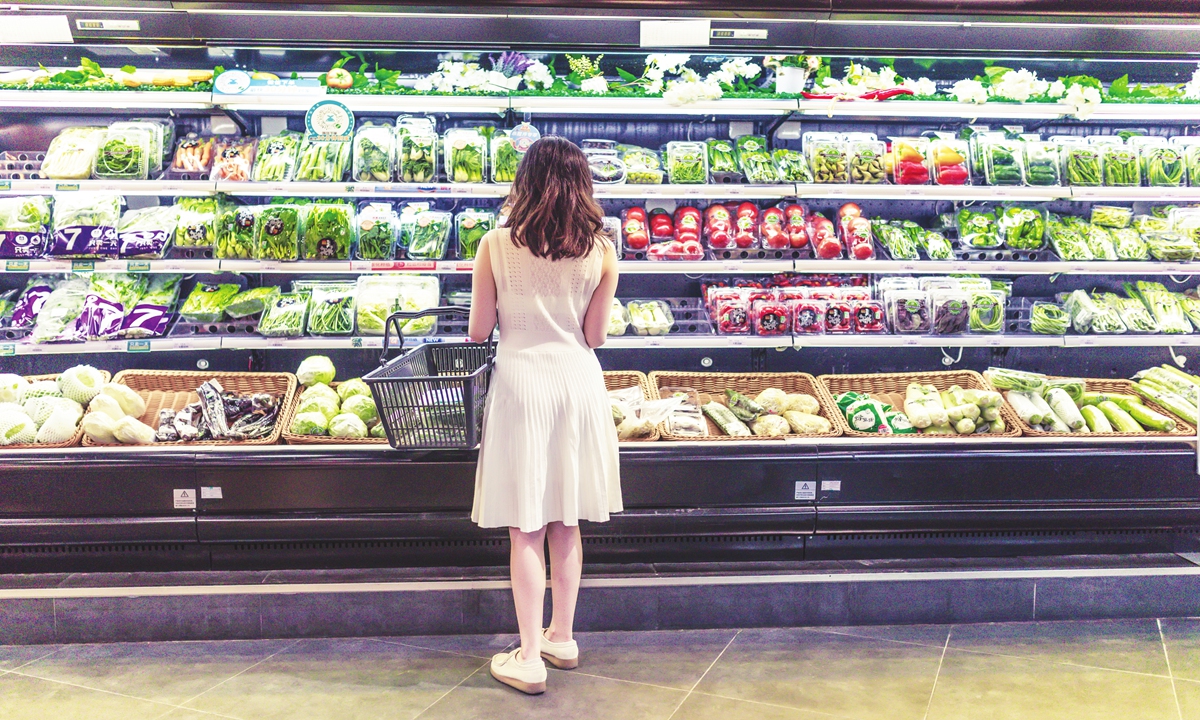
A young shopper is choosing vegetables. Photo: VCG
China's vegetable prices have soared in recent weeks, fueling fresh concern over food prices among Chinese consumers.
"The vegetables are so expensive that I have to feed on meat," commented one internet user on Chinese Twitter-like social media platform Sina Weibo.
"I bought a piece of broccoli for 10 yuan ($1.5) today. It was only 3.5 yuan a few days ago," another commented.
Since October, comments on soaring vegetable prices have flooded Chinese social media with uncommon price tags including "15 yuan for a kilogram of beans," "12.8 yuan for a kilogram of spinach" and "5.5 yuan for a cucumber" bombarding screens.
Many internet users have even said that vegetables now cost more than pork, the nation's staple meat which stands at a wholesale price of around 20 yuan per kilogram in the second half of October.
Vegetable crunch
The Global Times visited a Shanghai vegetable market and found that the retail price of some vegetables had risen to 20 yuan a kilogram, approaching the same price as meat. Many shoppers were seen leaving the market without buying any vegetables after discovering the price.
"The price of celery has jumped to 30 yuan per kilogram this week," a store owner surnamed Huang told the Global Times. "Little was left to pick after the fields were flooded. Some vegetables are unavailable because the weather was too cold," she added.
A farmer based in Shouguang, in east China's Shandong Province, a major vegetable producer, also told the Global Times that the output of vegetables is extremely low this year with tomato output cut by one fourth compared with previous years due to unusually heavy rains which have drenched the production.
According to recent data released by the Ministry of Agriculture and Rural Affairs (MOA), vegetable prices in October nationwide have risen by 16 percent month on month. Prices for 26 kinds of vegetables had increased from September, with cucumber and spinach rising as much as 80 and 45 percent respectively in October.
Zhang Jing, an analyst with the MOA said that the vegetable crunch comes after major northern vegetable producing areas experienced extreme rainfall which resulted in widespread flooding of vegetable crops.
Changing shopping habits
Rising vegetable prices have seen young consumer turning to different ways to save money, with some calculating for the best discounts at e-commerce platforms and others turning to buy the discounted vegetables at night.
Liang Yuhao, an engineer based in Hefei, East China's Anhui Province is among one of the consumers who have felt the pain of the price rise.
"The price of cucumbers for example has more than doubled and jumped to 15 yuan per kilogram. Although the rise is insignificant in number, the rate is insane," Liang told the Global Times.
Often cooking for himself, Liang now has to calculate the prices between various vegetables before deciding what's on the menu.
"It is like doing math problems," Liang said. "I tend to compare the price of different e-commerce platforms and hoard vegetables for the whole week so that I can use as many discounts coupons as possible."
Unlike Liang, Pan Chao, a Shanghai-based designer in his early 30s, prefers to shop at a local wet market.
"Compared with the packaged vegetables sold online, wet markets are cheaper," Pan told the Global Times on Monday.
He said that after shopping at wet market for vegetables, his cost for three meals was less than 30 yuan a day, 20 percent lower than shopping on e-commerce platforms.
"Just follow in the footsteps of senior citizens and they will lead you to the best deal," Pan said.
Others have turned to discounted products at supermarkets.
"Starting from 8 pm the vendors at supermarkets will offer discounts for unsold fresh food. If you come at a right time you can find food with a 50 percent discount. That's why I often pay a visit to my nearby supermarkets on my way home from work," Chen Chen, a Beijing-based bank clerk told the Global Times.
Capping prices
In response to increasing vegetable prices, the MOA issued a notice on Friday asking local authorities to ensure stable supply and steady prices of vegetables and take that as the major task ahead, especially for the upcoming New Year's Day, the Spring Festival and the Beijing 2022 Winter Olympics.
The measures include setting up a "green channel" for the transportation of fresh agricultural products to improve transportation efficiency of fruits and vegetables.
China's consumer price index (CPI), the main gauge of inflation, rose 0.7 percent in September year-on-year, data from the National Bureau of Statistics showed.
The recent rise in vegetable prices is expected to drive the CPI up for October, Liu Xuezhi, a Bank of Communications economist told the Global Times on Monday.
However, as the current rise in vegetable prices is mainly due to seasonal effects during the summer, it will not lead to a permanent increase on consumer price inflation after supply catches up in autumn, he noted.
"vegetable" - Google News
November 01, 2021 at 05:08PM
https://ift.tt/2Y3DQ86
Vegetables pricier than pork - Global Times
"vegetable" - Google News
https://ift.tt/2CyIOeE
https://ift.tt/3aVzfVV
Bagikan Berita Ini














0 Response to "Vegetables pricier than pork - Global Times"
Post a Comment